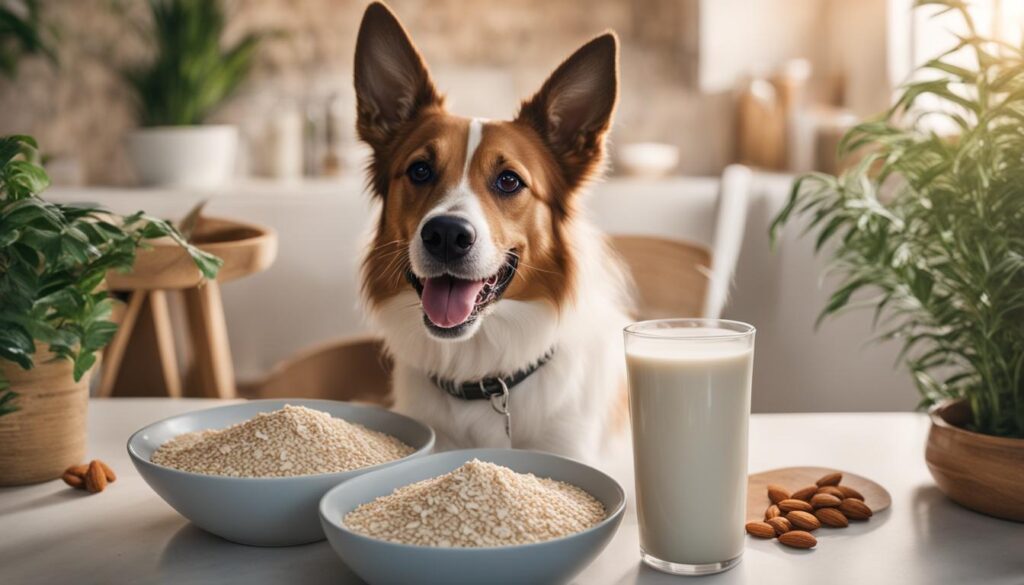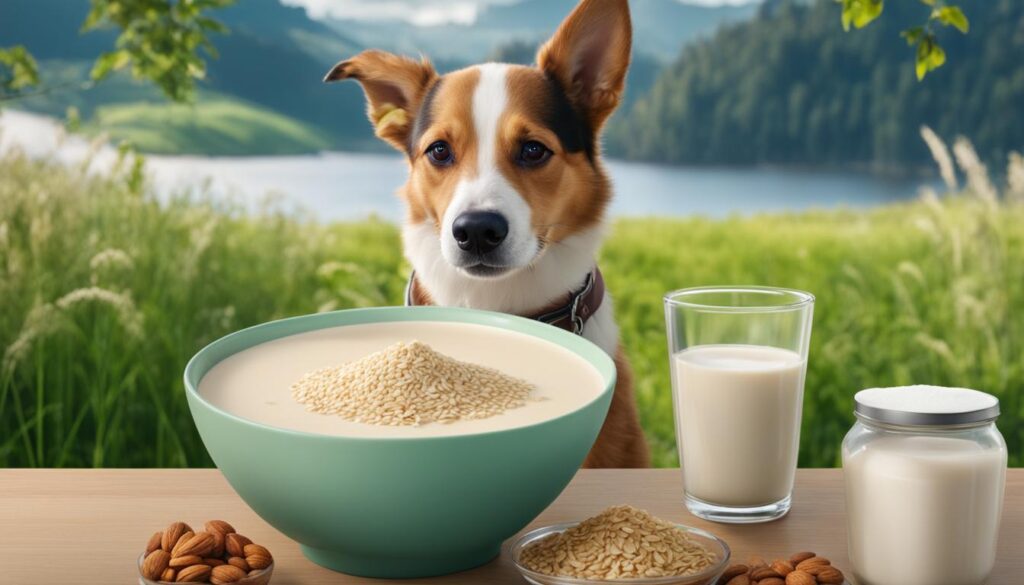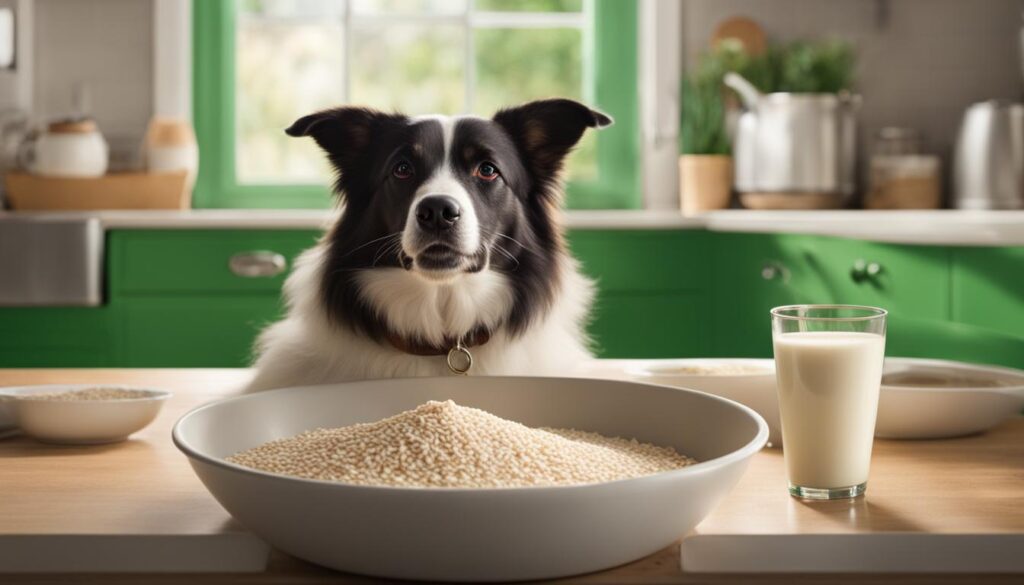Oat milk has gained popularity as a dairy-free alternative for humans, but can dogs safely consume it? As a professional copywriting journalist, I have researched the safety and benefits of oat milk for dogs and will provide you with all the information you need to make an informed decision.
Oat milk is a lactose-free option, making it potentially suitable for dogs with lactose intolerance. It is also lower in calories compared to cow’s milk, which can be beneficial for weight-conscious dogs. Additionally, oat milk is high in fiber and contains essential vitamins and minerals.
However, it is crucial to check the ingredients before giving oat milk to your furry friend. Some oat milk brands may contain added sugars or other additives that can be harmful to dogs. It’s best to opt for unsweetened oat milk.
When introducing oat milk to your dog, start with a small amount and monitor their reaction. Some dogs may experience digestive issues if they consume too much oat milk at once. It is always recommended to consult with your veterinarian before making any dietary changes for your dog.
Key Takeaways:
- Oat milk is a lactose-free alternative that may be suitable for dogs with lactose intolerance.
- It is lower in calories compared to cow’s milk, making it a good option for weight-conscious dogs.
- Oat milk is high in fiber and contains essential vitamins and minerals.
- Check the ingredient list for added sugars and opt for unsweetened oat milk.
- Start with small quantities and monitor your dog’s reaction when introducing oat milk to their diet.
The Pros and Cons of Plant-Based Milk for Dogs

Plant-based milk is gaining popularity as a dog-friendly alternative to cow’s milk. It offers some potential benefits for dogs, but it’s important to weigh the pros and cons before making it a regular part of your furry friend’s diet.
Benefits of Plant-Based Milk for Dogs
- Safe for lactose-intolerant dogs: Plant-based milk provides a lactose-free option for dogs who struggle to digest dairy products. This can help prevent digestive issues like diarrhea and gas.
- Lower in calories: Plant-based milk tends to be lower in calories compared to cow’s milk, making it a good choice for dogs who need to maintain a healthy weight or are on a weight loss plan.
Considerations with Plant-Based Milk for Dogs
- Lower protein content: Plant-based milks generally have lower protein content compared to cow’s milk. Protein is important for muscle development and overall health, so it’s essential to ensure your dog is getting enough protein from other sources in their diet.
- Possible added sugars or additives: Some plant-based milks may contain added sugars or harmful additives that can be detrimental to a dog’s health. Always check the ingredient list and opt for unsweetened varieties without unnecessary additives.
Here’s a visual comparison of plant-based milk and cow’s milk for dogs:
| Category | Plant-Based Milk | Cow’s Milk |
|---|---|---|
| Protein Content | Lower | Higher |
| Calories | Lower | Higher |
| Lactose Content | None | High |
| Additives | Possible | Minimal |
While plant-based milk can be a suitable option for some dogs, it’s important to consider individual dietary needs and consult with a veterinarian before making any significant dietary changes. Additionally, it’s essential to provide a balanced and varied diet to ensure your dog receives all the necessary nutrients they need to thrive.
Is Almond Milk Safe for Dogs?

When it comes to almond milk, it can be safe for dogs to consume in moderation. Almond milk is low in calories and fat, making it a suitable option for dogs who may be overweight or on a calorie-controlled diet. However, there are a few considerations to keep in mind before offering almond milk to your furry friend.
One important thing to note is that almond milk lacks calcium, which is an essential nutrient for dogs. Calcium plays a vital role in maintaining strong bones and teeth, as well as supporting proper muscle function. Therefore, if you decide to incorporate almond milk into your dog’s diet, it’s crucial to ensure they are getting sufficient calcium from other sources.
Additionally, when selecting almond milk for your dog, opt for unsweetened varieties without any added sugars or artificial sweeteners. Some artificial sweeteners, such as xylitol, can be toxic to dogs and may cause serious health issues. Always read the ingredient list carefully to ensure the almond milk is safe for your furry companion.
| Can dogs have almond milk? | Almond milk benefits for dogs | Almond milk nutrition for dogs | Is almond milk safe for dogs? | Almond milk recipes for dogs |
|---|---|---|---|---|
| Yes, in moderation | – Low in calories and fat, suitable for overweight dogs | – Lacks calcium, an important nutrient for dogs | – Should be unsweetened and free of artificial sweeteners or xylitol | – Almond milk can be used as an ingredient in homemade dog treats |
While almond milk can be a safe treat for your dog, it should not replace their primary source of nutrition. Always consult with your veterinarian before making any significant changes to your dog’s diet or introducing new foods. They can provide guidance tailored to your dog’s individual needs and ensure their overall health and well-being.
Is Oat Milk Safe for Dogs?

Oat milk is a popular alternative to cow’s milk, and many dog owners wonder if it’s safe to share this plant-based milk with their furry friends. The good news is that oat milk is generally safe for dogs to consume in small quantities.
One of the main benefits of oat milk for dogs is its low lactose content. Most dogs are lactose intolerant, meaning they have difficulty digesting lactose, the sugar found in milk. Oat milk provides a lactose-free option for dogs who may experience digestive issues after consuming dairy products.
In addition to being low in lactose, oat milk is also low in cholesterol and high in fiber. This can be beneficial for dogs with certain health conditions, such as high cholesterol or constipation.
Oat milk also contains essential vitamins and minerals, including vitamin B, vitamin E, and magnesium. These nutrients can support a dog’s overall health and well-being.
When feeding oat milk to your dog, it’s important to check the ingredients. Some commercial brands may add sugars or sweeteners, which can be harmful to dogs. Look for unsweetened oat milk options, or consider making your own oat milk at home.
It’s also advisable to start with small quantities of oat milk and monitor your dog’s reaction. While oat milk is generally safe for dogs, some individuals may still experience digestive upset if introduced to new foods too quickly or in large amounts.
Here is a simple recipe to make oat milk for your dog:
Oat Milk Recipe for Dogs:
- Blend 1 cup of rolled oats with 4 cups of water in a blender.
- Strain the mixture through a fine-mesh sieve or cheesecloth to remove any remaining solids.
- Store the oat milk in a clean, airtight container in the refrigerator for up to 3 days.
Remember, while oat milk can be a nutritious addition to your dog’s diet, it should not replace their regular meals. It’s always best to consult with your veterinarian before making any significant changes to your dog’s diet or introducing new foods.
Is Coconut Milk Good for Dogs?

Coconut milk can be a beneficial addition to a dog’s diet, offering potential advantages for their coat and skin health. It contains healthy fats and essential vitamins that can promote a shiny and moisturized coat. However, it is important to consider a few factors before introducing coconut milk to your furry friend.
While coconut milk is generally safe for dogs, some canines may be allergic to coconuts or have difficulty digesting them. It is crucial to monitor your dog for any signs of allergies or gastrointestinal issues after consuming coconut milk. If you notice any adverse reactions, discontinue its use and consult with your veterinarian.
Additionally, coconut milk is high in calories and fat, which can be a concern for weight-conscious dogs or those prone to pancreatitis. It is essential to practice moderation and ensure that coconut milk is not a primary component of your dog’s diet.
Here is an enticing coconut milk recipe for dogs:
- Coconut Milk Smoothie:
This easy-to-make smoothie can serve as a nutritious and refreshing treat for your furry companion.
| Ingredients | Instructions |
|---|---|
|
|
Remember to choose unsweetened coconut milk without any additives or sweeteners when preparing recipes for your dog.
In conclusion, while coconut milk can offer benefits for dogs, such as improved coat and skin health, it is essential to proceed with caution and ensure moderation. Monitor for any allergic reactions or digestive issues, and consult with your veterinarian before introducing coconut milk or any new food to your dog’s diet.
Can My Dog Have Soy Milk?

Soy milk is a popular plant-based alternative that many humans enjoy. However, it may not be the best option for our furry friends. While soy milk may seem like a healthy choice at first glance, it contains plant estrogens that can disrupt hormone levels in dogs. This can lead to various health issues and should be avoided.
Additionally, soy milk often contains added sugars, which can be detrimental to a dog’s health. Excessive sugar consumption can lead to weight gain, dental problems, and even diabetes. It is important to keep your dog’s sugar intake in check and opt for healthier alternatives.
Fortunately, there are other plant-based milks that can be safer for dogs to consume. Almond milk, coconut milk, and oat milk are delicious alternatives that provide similar benefits without the potential drawbacks of soy milk. These options are generally lower in sugar and do not contain plant estrogens, making them a better choice for your canine companion.
When introducing any new food or drink to your dog’s diet, it is always important to consult with your veterinarian. They can provide specific guidance tailored to your dog’s individual needs and ensure that you are making the best choices for their health.
Plant-Based Yogurts for Dogs
Plant-based yogurt, such as almond, coconut, and oat milk yogurt, can be a healthy and tasty treat for dogs. These creamy bases provide a nutritious alternative to dairy-based yogurts and can be beneficial for dogs with lactose intolerance. Additionally, plant-based yogurts offer a range of potential health benefits for our furry friends.
The Benefits of Plant-Based Yogurt for Dogs
There are several advantages to incorporating dog-friendly plant-based yogurts into your pet’s diet:
- Improved digestion: Plant-based yogurts are typically easier for dogs to digest compared to dairy-based yogurts. They contain beneficial probiotics that can promote a healthy gut and improve digestive function.
- Healthy skin and coat: The omega-3 fatty acids found in plant-based yogurts can contribute to a glossy and healthy coat for your furry friend.
- Enhanced immune system: The live cultures in plant-based yogurts can support your dog’s immune system, helping them to fight off illnesses and stay healthy.
When choosing plant-based yogurts for your dog, it’s important to opt for unsweetened varieties to avoid added sugars. Reading the ingredient list is essential to ensure that the yogurt doesn’t contain any harmful additives or artificial sweeteners that could be harmful to your pet’s health.
Plant-Based Yogurt Recipes for Dogs
Creating homemade plant-based yogurt treats for your furry friend is a wonderful way to provide them with a nutritious snack. Here are a few simple recipes to try:
- Almond Berry Delight: In a blender, combine unsweetened almond milk yogurt, fresh berries (such as blueberries or strawberries), and a drizzle of honey. Blend until smooth and freeze in small silicone molds for refreshing doggy popsicles.
- Coconut Banana Bites: Mix mashed ripe bananas with unsweetened coconut milk yogurt. Spoon the mixture into ice cube trays and freeze for a tasty, tropical treat.
- Oatmeal Peanut Butter Swirl: Combine cooked oatmeal, unsweetened peanut butter, and oat milk yogurt in a mixing bowl. Pour the mixture into a silicone tray and freeze. Serve as a cool and creamy snack.
Remember to introduce new treats gradually and observe your dog for any signs of allergies or digestive issues. Not all dogs may tolerate plant-based yogurts, so consulting with your veterinarian is always recommended before making any significant changes to your pet’s diet.
Can dogs drink milk?

As a professional journalist, I often come across questions about what dogs can and cannot consume. One common query that arises is whether dogs can drink milk. It’s a topic that concerns many dog owners, as milk is often associated with being a wholesome and nutritious beverage. However, the truth is that not all dogs can safely consume cow’s milk.
While milk is indeed rich in vitamins and minerals, most dogs are lactose-intolerant, meaning they lack the necessary enzymes to properly digest lactose, the sugar found in milk. This can lead to gastrointestinal issues such as diarrhea, vomiting, and stomach discomfort. In some cases, regular consumption of milk can even contribute to weight problems and diabetes in dogs.
So, can dogs have cow’s milk? In general, it is best to avoid giving regular cow’s milk to dogs. However, there are alternatives available that are safer for our furry friends. Plant-based milk options, such as almond, coconut, and oat milk, can be considered as alternatives to cow’s milk.
It is important to note that introducing any new food or beverage into your dog’s diet should be done with caution and in moderation. It is always advisable to consult with a veterinarian before making any dietary changes for your dog to ensure their health and well-being.
Key Takeaways:
- Dogs are often lactose-intolerant and may struggle to digest cow’s milk properly.
- Regular consumption of cow’s milk can lead to gastrointestinal issues, weight problems, and even diabetes in dogs.
- Plant-based milk options, such as almond, coconut, and oat milk, can be safer alternatives to cow’s milk.
- Consulting with a veterinarian before making any dietary changes for your dog is always recommended.
What are plant-based milk products?
Plant-based milk products are dairy alternatives derived from various plant sources, such as soy, almond, coconut, and oat. These milks are gaining popularity as more people opt for plant-based diets or have dietary restrictions. Plant-based milk products offer a viable option for individuals who are lactose intolerant or prefer not to consume dairy. They are also becoming increasingly sought after by pet owners looking for milk alternatives for their dogs.
It’s important to understand the different types of plant-based milk to determine their suitability for dogs. Here are some common types of plant-based milk:
- Soy Milk
- Almond Milk
- Coconut Milk
- Oat Milk
Each type of plant-based milk has its unique nutritional content and benefits. Let’s take a closer look at them:
Soy Milk
Soy milk is made from soybeans and is a popular choice among plant-based milk alternatives. It is rich in protein and contains essential amino acids, making it a nutritious option. However, soy milk may have higher levels of plant estrogens, which can impact hormone levels in dogs. While it is generally safe for dogs to consume in moderation, other plant-based milks may be a better choice.
Almond Milk
Almond milk is made from ground almonds and water. It is low in calories and fat, making it a suitable option for dogs with weight concerns. However, almond milk lacks calcium, an essential nutrient for dogs’ bone health. It should be unsweetened and free of artificial sweeteners or xylitol, which can be toxic to dogs.
Coconut Milk
Coconut milk is a creamy and flavorful milk alternative made from the flesh of coconuts. It is rich in healthy fats and contains vitamins that can benefit a dog’s coat and skin health. However, some dogs may be allergic to coconuts or have difficulty digesting them. Coconut milk is also high in calories and fat, so it should be given in moderation.
Oat Milk
Oat milk is made from soaked and blended oats and water. It is low in lactose and cholesterol and high in fiber, making it a healthier alternative. Oat milk also contains essential vitamins and minerals, such as vitamin B12 and calcium. However, it’s important to check the ingredients for added sugars or sweeteners, as some commercial oat milks may contain these additives.
Understanding the nutritional content and potential allergens in each type of plant-based milk is crucial when considering them as alternatives for your dog. Consult with your veterinarian to determine which type of plant-based milk may be suitable for your dog’s specific dietary needs.
| Plant-Based Milk | Nutritional Content | Potential Allergens |
|---|---|---|
| Soy Milk | Protein, essential amino acids | Higher levels of plant estrogens |
| Almond Milk | Low in calories and fat | Lacks calcium |
| Coconut Milk | Healthy fats, vitamins | Potential allergies, high in calories and fat |
| Oat Milk | Low in lactose and cholesterol, high in fiber, vitamins, and minerals | Potential added sugars or sweeteners |
Things to Consider Before Adding Plant-Based Milk to Your Dog’s Diet
Before incorporating plant-based milk into your dog’s diet, it is crucial to take several factors into consideration and consult with a veterinarian. Each dog has unique health needs, and it is important to ensure that plant-based milk supplements align with their individual requirements. By discussing with a vet, you can assess the potential health risks and benefits associated with plant-based milk, ensuring the well-being of your beloved pet.
In cases where supplementation is recommended, it is vital to discuss the specific type of milk alternative with your veterinarian. Different plant-based milks, such as almond, coconut, and oat milk, vary in their nutritional profiles and may have specific benefits for your dog’s health. By understanding the nutritional values and potential effects of each milk option, you can make an informed decision about which plant-based milk is the most suitable for your dog.
Remember, not all dogs may require plant-based milk supplementation, and their existing diet may already provide the necessary nutrients. A veterinarian’s expertise can help determine whether plant-based milk is necessary or beneficial for your dog’s overall health and well-being.
Considerations for Plant-Based Milk for Dogs:
- Assess your dog’s individual health needs
- Consult with a veterinarian before introducing plant-based milk
- Weigh potential health risks and benefits
- Discuss the type of milk alternative with your vet
- Understand the nutritional values of different plant-based milks
“Before incorporating any new dietary element into your dog’s routine, it’s always important to consult with a veterinarian who has a complete understanding of your pet’s unique needs and health considerations.” – Dr. Sarah Thompson, DVM, ABC Veterinary Clinic
By taking these considerations into account and seeking professional advice, you can ensure that plant-based milk supplementation, if deemed necessary, is a safe and beneficial addition to your dog’s diet.
Can Dogs Drink Rice Milk?
Rice milk is often considered a safe alternative for dogs, but it’s important to note that raw rice itself is not recommended for their consumption. If you’re worried about using raw rice as a carbohydrate source for your dog, there are other viable options available. Puffed white beans or lentils can serve as excellent alternatives to fermented rice, providing the necessary carbohydrates your dog needs. However, it’s always essential to conduct thorough research and consult with a veterinarian before introducing any new foods into your dog’s diet.
In the search for suitable milk alternatives for dogs, it’s important to consider their specific dietary requirements and potential health concerns. While rice milk can have its benefits, understanding its limitations and exploring alternative options is crucial.
Benefits of Rice Milk for Dogs
Rice milk is a dairy-free, lactose-free, and cholesterol-free milk alternative, making it suitable for dogs with lactose intolerance or sensitivities. It is also generally low in fat and calories, which can be beneficial for dogs on weight management diets. Rice milk is naturally sweet, which can make it more appealing to some dogs, and it is often fortified with essential vitamins and minerals. However, it’s vital to check the ingredient list for any potential additives or added sugars that may not be suitable for your dog’s health.
Rice Milk Alternatives for Dogs
If you’re hesitant about using rice milk or looking to try other options, there are several alternative plant-based milk products available for dogs. Here is a table comparing some popular milk alternatives:
| Milk Alternative | Suitable for Dogs | Benefits | Considerations |
|---|---|---|---|
| Oat Milk | Yes | High in fiber and essential vitamins and minerals | Check for added sugars and start with small quantities |
| Almond Milk | Yes, in moderation | Low in calories and fat | Avoid sweetened or flavored varieties and check for potential allergens |
| Coconut Milk | Yes, in moderation | Rich in healthy fats and beneficial for skin and coat health | High in calories and fat, may cause digestive issues in some dogs |
| Soy Milk | No | Contains plant estrogens that can disrupt hormone levels in dogs | Not recommended due to potential health risks |
Remember, always conduct thorough research, consult with a veterinarian, and consider your dog’s specific health needs before introducing any new foods or milk alternatives into their diet.
Wrapping Up
After careful consideration, it is clear that oat milk can be a safe and nutritious option for dogs when consumed in moderation. This dairy alternative not only provides a lactose-free option for dogs with lactose intolerance but also offers various health benefits. Oat milk is lower in calories compared to cow’s milk, making it suitable for maintaining a healthy weight in dogs. Additionally, oat milk is rich in fiber, essential vitamins, and minerals, contributing to a well-rounded diet for our furry friends.
However, it is crucial to be mindful of the ingredients in oat milk. Some commercially available oat milk products may contain added sugars or artificial sweeteners, which can be harmful to dogs. It is vital to choose oat milk without these additives and opt for unsweetened varieties.
When introducing oat milk to your dog’s diet, start with small quantities to prevent any potential digestive issues. As with any dietary changes, it is always recommended to consult with a veterinarian. They can provide guidance based on your dog’s specific needs and ensure that oat milk is a suitable addition to their diet.
In conclusion, oat milk can be a safe and beneficial alternative to cow’s milk for dogs. It is important to choose oat milk without added sugars, introduce it gradually, and seek professional advice to ensure the well-being of your furry companion. Incorporating oat milk into your dog’s diet can provide them with a flavorful and nutritious option that aligns with their dietary needs.
FAQ
Can dogs have oat milk?
Yes, oat milk can be safe for dogs to consume in small quantities. It is low in lactose and cholesterol, high in fiber, and contains essential vitamins and minerals.
What are the benefits of oat milk for dogs?
Oat milk offers benefits such as being lactose-free, lower in calories than cow’s milk, and high in fiber and essential nutrients.
Is oat milk safe for dogs?
Oat milk is generally safe for dogs to consume, but it is important to check the ingredients for added sugars or sweeteners and to start with a small amount to prevent digestive issues.
Can I give oat milk to my lactose-intolerant dog?
Yes, oat milk can be a good option for lactose-intolerant dogs, as it is low in lactose and can be easier to digest than cow’s milk.
Can oat milk replace cow’s milk in my dog’s diet?
Oat milk can be a suitable alternative to cow’s milk for dogs, especially for those with lactose intolerance. However, it is important to consider other nutritional needs and consult with a veterinarian before making any dietary changes.
Are there any oat milk recipes for dogs?
Yes, there are oat milk recipes for dogs, such as homemade dog treats or adding oat milk to homemade dog food. Just make sure the other ingredients are safe for dogs and consult with a veterinarian for specific recipes.
What are the downsides of plant-based milk for dogs?
Some downsides of plant-based milk for dogs include lower protein content compared to cow’s milk and the possibility of added sugars or harmful additives. It is important to choose plant-based milk options that are appropriate and safe for dogs.
Can dogs have almond milk?
While almond milk can be safe for dogs in moderation, it is important to be aware of certain considerations. Almond milk is low in calories and fat, making it suitable for overweight dogs. However, it lacks calcium, which is an important nutrient for dogs. It should also be unsweetened and free of artificial sweeteners or xylitol, which can be toxic to dogs.
Can dogs have coconut milk?
Coconut milk can offer benefits for a dog’s coat and skin health due to its healthy fats and vitamins. However, some dogs may be allergic to coconuts or have trouble digesting them. Coconut milk is also high in calories and fat, so moderation is key, especially for weight-conscious dogs.
Can dogs have soy milk?
No, soy milk is not the best option for dogs due to the plant estrogens it contains, which can disrupt hormone levels. Additionally, soy milk often contains sugar, which can lead to weight gain and tooth decay in dogs. Other plant-based milks like almond, coconut, and oat milk are safer choices.
Can dogs have plant-based yogurts?
Yes, plant-based yogurts such as almond, coconut, and oat milk yogurt can be a healthy and tasty treat for dogs. These creamy bases can be combined with fruits and vegetables to create nutritious snacks. It is important to choose unsweetened yogurt and read the ingredient list carefully.
Can dogs drink regular cow’s milk?
While milk is rich in vitamins and minerals, most dogs are lactose-intolerant and cannot properly digest milk. It can cause gastrointestinal problems, weight issues, and even diabetes in dogs if given regularly. It is best to avoid giving regular cow’s milk to dogs.
What are plant-based milk products?
Plant-based milk products are derived from various plant sources such as soy, almond, coconut, and oat. They offer lower lactose content and can be a safer alternative for dogs with lactose intolerance. However, it is important to understand the nutritional components and other ingredients in each type of plant-based milk to determine their suitability for dogs.
What should I consider before adding plant-based milk to my dog’s diet?
Before adding plant-based milk to your dog’s diet, it is essential to consider their individual health needs and discuss with a veterinarian. Plant-based milk supplements should be weighed against any potential health risks and benefits. In cases where supplementation is recommended, the type of milk alternative and its nutritional values should be discussed with a vet.
Can dogs have rice milk?
Rice milk is safe for dogs to consume, but raw rice is not recommended. If concerned about raw rice, there are other alternatives to provide carbohydrates to dogs. Puffed white beans or lentils can be used instead of fermented rice. Always research and consult with a vet before introducing new foods to your dog.






